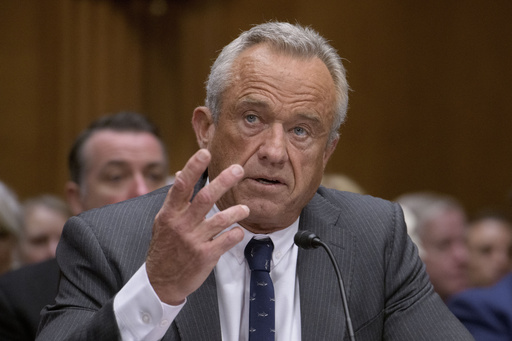
In Washington, the Senate is gearing up for a vote this Thursday regarding the confirmation of Robert F. Kennedy Jr. as the new health secretary, a role that oversees a significant budget of $1.7 trillion allocated for vaccines, food safety, and health insurance programs serving nearly half the American population.
Despite several members of the Republican Party voicing serious doubts about his opinions on vaccines, Kennedy is anticipated to secure the necessary votes for confirmation unless an unexpected development occurs.
Kennedy, at 71 years old, has been a public figure since childhood due to his famous lineage and personal family losses. He has gathered a substantial following with his populist stances on topics related to food, chemicals, and vaccines, some of which are considered extreme.
His influence magnified during the COVID-19 pandemic, as he dedicated considerable effort to a nonprofit organization that engaged in legal actions against vaccine manufacturers and mobilized social media campaigns aimed at undermining public confidence in vaccines and associated governmental organizations.
With the support of former President Donald Trump, Kennedy claims that he holds a “unique position” to restore faith in public health bodies including the Food and Drug Administration (FDA), Centers for Disease Control and Prevention (CDC), and National Institutes of Health (NIH).
Many Republican senators have rallied behind Kennedy’s initiatives, often referencing his newly adopted slogan of “Make America Healthy Again” during speeches.
Recently, North Carolina Senator Thom Tillis expressed hopes that Kennedy would take aggressive measures to control healthcare expenses and enhance the health of Americans. However, not all Republicans are onboard; Louisiana Senator Bill Cassidy, who is also a physician, requested guarantees that Kennedy would not alter current vaccine recommendations before extending his endorsement.
On the Democratic side, skepticism persists. During testimonies, they attempted to prode Kennedy into rejecting the long-debunked theory that vaccines cause autism. Concerns were also raised about the potential for Kennedy to gain financially from modifications to vaccine guidelines or the reduction of federal legal protections for vaccine manufacturers.
Last year, Kennedy earned over $850,000 from a deal that directed clients to a law firm involved in lawsuits against the creators of Gardasil, a vaccine that prevents human papillomavirus and cervical cancer. He has pledged that if he assumes the role of health secretary, he will redirect income from this agreement to his son.
Kennedy is poised to navigate these responsibilities in the context of a significant federal bureaucratic restructuring influenced by billionaire Elon Musk, which has abruptly halted billions of taxpayer dollars designated for public health efforts, leaving countless federal employees in uncertainty about their employment status.
Furthermore, just last week, the NIH disclosed plans to limit funding for medical research provided to universities, specifically concerning advancements in the treatment of diseases such as cancer and Alzheimer’s.
Kennedy has also advocated for an overhaul of staffing at key agencies, namely the NIH, FDA, and CDC. He previously promised to dismiss 600 employees at the NIH, which is the leading supporter of biomedical research in the country.

